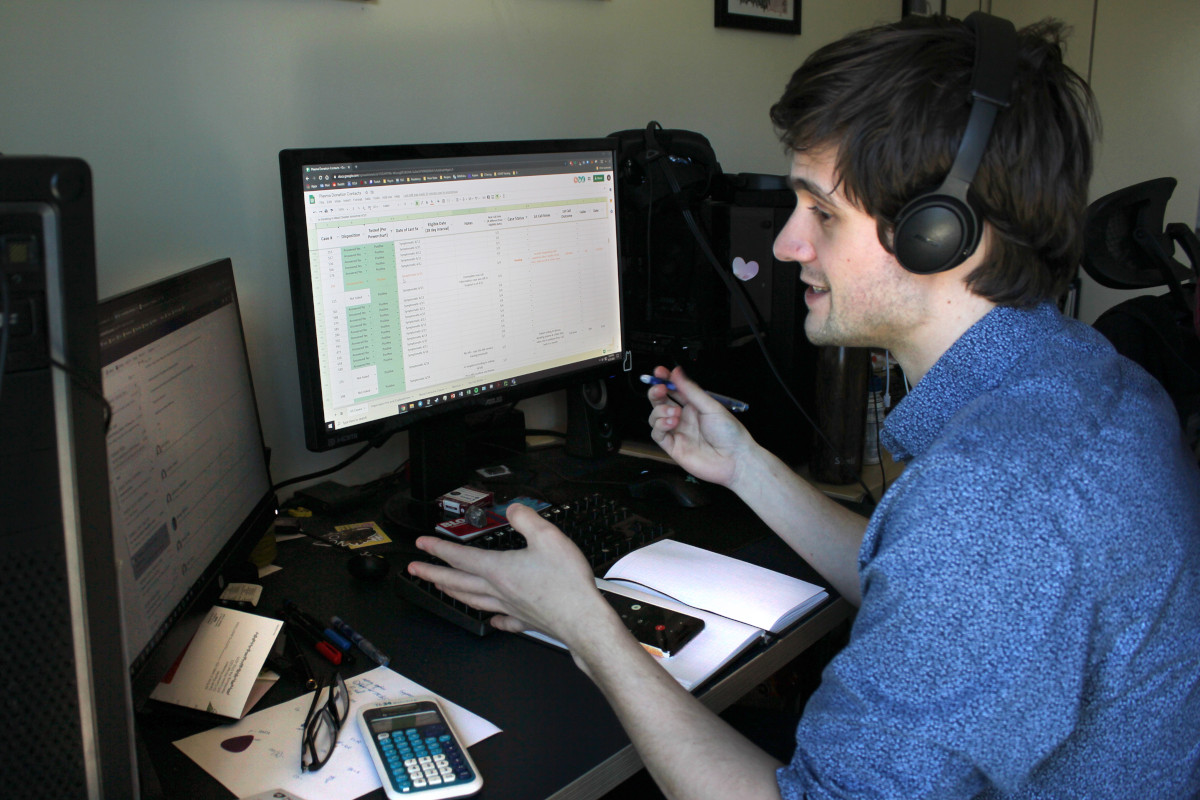Contact Tracing Task Force works to limit the spread of COVID-19

Maintaining public health is a team effort for Penn State’s medical, graduate and nurse practitioner students. Faculty and students at Penn State College of Medicine and Penn State College of Nursing have launched a Contact Tracing Task Force in an effort to mitigate the spread of COVID-19.
Contact tracing is a public health strategy that identifies and monitors individuals who have come in contact with a person who tested positive for a virus, in this case COVID-19. The goal is to inform those who’ve been exposed and educate them about best practices for quarantining to reduce transmission. If a contact develops symptoms, the tracing process starts over.
The task force, led by third-year medical student Matthew Pelton, is working with Penn State Health and Mount Nittany Medical Center to identify patients who have tested positive for COVID-19. Once the task force is notified of a positive case, they work to identify everyone the patient came in contact with, going back to two days before symptoms surfaced. This timeline is based on research that indicates the contagious period of COVID-19 begins before symptoms surface. Armed with their list of contacts, the contact tracers call everyone who may have been exposed and alert them to their risk of infection. As of May 4, more than 1100 calls have been made to contacts in seven Pennsylvania counties and three other states.
In addition to this work, the Contact Tracing Task Force includes student groups to onboard new contact tracers and identify recovered COVID patients willing to donate plasma containing antibodies that may be a useful treatment for patients hospitalized with COVID-19.
“The task force began with just 10 contact tracers in a daily meeting that would last over an hour,” said Nicole Legro, a third-year medical student at the College of Medicine who oversees the onboarding of all new contact tracers. “Since then, more than 90 students have joined in our effort to mitigate the spread of COVID-19.”
Additionally, there is an intervention-based sub-group that works to identify and share resources for quarantined individuals. These students help identify and alleviate the barriers some patients may face in accessing groceries or medications while quarantined at home.
With oversight from trained faculty, contact tracers provide patients and their contacts with medically sound guidance and support. The opportunity to educate the public during these unprecedented times is not lost on the contact tracers, many of whom have noted the chance to teach contacts how to protect themselves as a high point of their affiliation with this task force.
“We use a script that helps us communicate with patients of all educational and experience levels,” said Lindsay Buzzelli, third-year medical student at the College of Medicine. “Patients appreciate the way we individually tailor our calls to reflect their current experience and provide the education and guidance they need. Overall, everyone is grateful that someone is checking in on them and want to do everything in their power to quarantine effectively and protect others.”
Dr. Chris Sciamanna, professor of medicine and public health sciences at the College of Medicine, leads this regional contact-tracing effort. He notes that identifying and contacting those who test positive and those they may have been exposed is a once-in-a-lifetime learning opportunity for students in the midst of the pandemic. Sciamanna says the creation of this task force has the potential to support the health care system and provide experiential learning opportunities for students in place of their traditional clinical experience. It also provides students with a way to continue to learn key concepts like teamwork, inter-professional collaboration and social determinants of health.
This initiative has also given nurse practitioner students and medical students the opportunity to work together, a collaboration that normally doesn’t surface until students enter the workforce. According to Shannon Nicosia, a graduating nurse practitioner student, working with the medical students has been a positive experience.
“The research and work that was done to get this project started is impressive,” Nicosia said. “It’s nice to know that nurse practitioners are bringing a unique skill set to the table with our extensive clinical and bedside experience.”
Sciamanna says the risk of overwhelming the health care system with a surge of COVID-19 patients has the potential to cripple the system’s ability to provide care to those who need it most. Efforts like the COVID-19 Contact Tracing Task Force are benefitting the health care communities in which these positive cases and their contacts reside.
If you're having trouble accessing this content, or would like it in another format, please email Penn State Health Marketing & Communications.
